John Darby's Synopsis of the Books of the Bible (5 vols.)
Digital Logos Edition
Overview
Read chapter-by-chapter commentary on the entire Bible along with one of the founding figures and most influential thinkers of dispensationalism—John Darby.
John Darby’s 5-volume Synopsis of the Books of the Bible has played a central role in the emergence of fundamentalism and the development of American Christianity. As the intellectual and theological forerunner of well-known preachers such as Dwight Moody and contemporary authors such as Tim LaHaye, John Darby’s influence is profound. From a dispensational interpretation of the Bible, to the contemporary understanding of the rapture and the End Times, the prominent features of evangelical theology are indebted to Darby’s influence.
Logos is pleased to offer John Darby’s Synopsis of the Books of the Bible, which includes Darby’s chapter-by-chapter commentary of the entire Bible. These volumes contain introductions to each book of the Bible—written by Darby himself—along with overviews of important biblical themes, such as the implications of biblical prophecy and the nature of divine revelation. Darby’s commentary is indispensable for personal study of the Bible, and a vital addition to the libraries of theologians, church historians, and anyone interested in the emergence of dispensationalist thought.
This title is included in the following collections
You can save when you purchase this product as part of a collection.
Logos 8 Messianic Jewish Bronz...
$89.99$89.99Logos 8 Messianic Jewish Silve...
$349.99$349.99Logos 8 Messianic Jewish Gold ...
$849.99$849.99Logos 6 Baptist Gold Legacy Li...
$849.99$849.99
- $849.99
- $1,499.99
- $1,499.99
- $1,499.99
- $2,999.99
- $2,999.99
- $2,999.99
- $2,999.99
- $4,749.99$3,562.49
- $4,749.99
- $4,749.99
- $11,399.99
- $11,399.99
- $11,399.99
- $11,399.99
- $23,999.99$17,999.99
- $21,749.99
- $24,999.99

- Introductions and overviews to important biblical themes
- Chapter-by-chapter analysis of the entire Bible
...I literally devoured these five volumes, giving almost every spare moment to them, so that I read them in two weeks' time, and I think I am safe in saying that they opened up the Scripture in their comprehensiveness in a way that nothing else has ever touched.
Darby left a lasting legacy for us today.
—Conservative Theological Journal
To see classical dispensationalist theology at its best, one must read Darby…
—Journal of the Evangelical Theological Society
Darby was a brilliant man…
—Moody Handbook of Theology
- Title: Synopsis of the Books of the Bible
- Author: John Darby
- Publisher: Loizeaux Brothers
- Volumes: 5
- Pages: 3,024
- Resource ID: {0D65B63F-E4E4-4AB7-9EC4-415E3594BB1E}
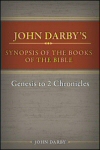
In this volume, Darby introduces important themes of creation, sin, and the relationship between good and evil in the lives of key figures found in the first half of the Old Testament. He connects creation to God’s law and human responsibility—in these books, says Darby, we find God’s principles for maintaining relationships with individuals. In this way, God’s kingdom in the Old Testament not only resembles the Church in the present, but also God’s intentions for the future. Darby also explains the first two dispensations of the relationship between humanity and God without the law, and humanity’s relationship to God with the law. Darby’s commentary exhibits key tenets of dispensationalist thought, and lays the groundwork for interpreting the rest of the Bible.
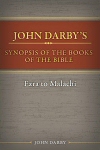
The second volume continues Darby’s synopsis of the Old Testament, beginning with Ezra. In this volume, Darby includes an interpretation of the Psalms which connects the words of David to Christ’s suffering and death. This volume also contains introductions to the prophets and to the nature of prophecy in general. Some prophecy, he says, is meant to warn Israel, while other prophecy promises future glory. Darby’s impact on the role of prophecy, the process of prophetic interpretation, and the reading of apocalyptic literature in the modern church has been felt ever since.
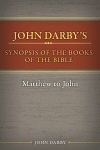
How does the Old Testament differ from the New Testament? Does one carry more weight than the other? The third volume of Synopsis of the Books of the Bible includes introductions to the Gospels and overviews of the New Testament in which Darby answers these very questions. In the Old Testament, he says, God has spoken. But in the New Testament, God manifests himself on earth. Most notably, however, Darby asserts that the Holy Spirit makes God clearer through the events of the world, beginning with the life and death of Christ, and continuing into God’s renewed relationship with Israel and the coming events of the rapture and Christ’s second return.
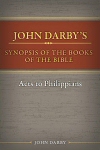
Darby’s synopsis on the middle books of the New Testament is devoted to the Holy Spirit, the events at Pentecost, and the work of the Spirit through apostolic authority. He also provides an introduction to the Epistles as a literary genre, noting that they connect the life of God with life on earth. His synopsis on Romans is especially thorough, because, he says, it aptly describes Christ’s presence on earth and the life of the Church.
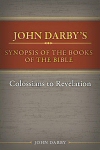
Darby concludes his synopsis on the New Testament with lengthy commentary on the remainder of Paul’s epistles, the Pastoral Epistles, and the apocalyptic literature found in Revelation. He connects the future of God’s work to events in history by interpreting the symbolism in Revelation. His literal reading of apocalyptic literature prefigured fundamentalist biblical interpretation for the two centuries that followed.

Born in London in 1801, John Darby attended Westminster School and Trinity College, where he graduated in 1819. Darby became a lawyer, but practiced law for only one year, since he felt the nature of his profession was incompatible with his religious beliefs. He was ordained as a deacon in the Church of England in 1825, and became a priest in 1826.
As a priest, Darby became quickly disenchanted by what he perceived as the empty ritual and corrupt bureaucracy prevalent in the Church of England. He resisted the necessity of clergy, asserting that their role contradicted New Testament teaching, and claimed that the presence of clergy implicitly denied that the Holy Spirit speaks to laypersons. He gathered with other like-minded dissidents to form the movement which later became known as the Plymouth Brethren, and he formally left the Church of England in 1832.
A New Perspective
Darby’s ecclesiological pessimism gave way to a new perspective on Scripture, which later became known as dispensationalism. In Darby’s view, the scope of history is divided into seven separate dispensations, each comprising a new stage of God’s revelation. Darby advanced the following dispensationalist scheme:
- Eden to the Flood
- Noah
- Abraham
- Israel
- Under the law
- Under the priesthood
- Under the kings
- Gentiles
- The Spirit
- The Millennium
Since the church finds itself in the sixth dispensation, Darby used a literal interpretation of apocalyptic literature to predict the events of the seventh dispensation. In doing so, he systematized the notion of the secret rapture and developed an extensive pre-millennial eschatology, in which historical events can be used to predict the advent of the Millennium—the seventh dispensation.
Impact and Legacy
Later in his lifetime, Darby traveled extensively. He delivered a series of lectures in Lausanne, Switzerland in 1837, and made seven visits to the United States and Canada, where he influenced individuals such as Dwight Moody and A.J. Gordon and initiated the Bible conference movement. Darby’s influence is also found in the writings of C.I. Scofield, Charles Henry Mackintosh, and William E. Blackstone, whose writings contributed to the rise of fundamentalism in America during the early twentieth century. More recently, Darby’s impact can be felt in books by Hal Lindsay, Tim LaHaye, and Jerry Jenkins.
Reviews
8 ratings

Peter O'Handley
10/5/2020

Mark D. Anderson
3/30/2017

Michael
1/19/2016

Schamma
10/30/2014

Matthew Dennison
11/30/2013

Metal Phil
10/5/2013
I first bought this in print a year or so ago. Shortly after I decided to buy it digitally so I could have access to it at anytime- that's how much I liked it, lol! I really appreciate Darby's thoughts here and am grateful for his reemphasis of grace and of necessary Biblical distinctions. Also, I am thankful that Darby almost always just repeats what the text says and adds thoughts where necessary. The less theologizing (making theological assertions without plain use of the Biblical text) the better!
Thomas M. Campbell
1/21/2012
I first purchased the physical set of John Nelson Darby's "Synopsis of the Books of the Bible" back in 1970. I still refer to them in my studies. He was a remarkable teacher of the Holy Scriptures.